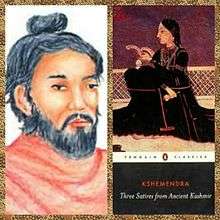Kshemendra
| Kshemendra | |
|---|---|
 Picture of two great poets |
Kshemendra (c. 990 – c. 1070 CE) was a Kashmirian poet of the 11th century, writing in Sanskrit.
Born into an old, cultured, and affluent family,[1] both his education and literary output were broad and varied. He studied literature under "the foremost teacher of his time, the celebrated Shaiva philosopher and literary exponent Abhinavagupta".[1] He also studied — and wrote about — both Vaishnavism and Buddhism.[2] His literary career extended from at least 1037 (his earliest dated work, Brihatkathāmanjari, a verse summary of the lost "Northwestern" Bṛhatkathā; itself a recension of Gunadhya's lost Bṛhatkathā — "Great Story") to 1066 (his latest dated work, Daśavataracharita, "an account of the ten incarnations of the god Visnu").[3] In addition to the genres listed below, Kshemendra also composed plays, descriptive poems, a satirical novel, a history, and possibly a commentary on the Kāma Sūtra (all now known only through references in other works).[4]
Extant works[5]
Abridgements
- Ramāyaṇamanjari — Verse abridgement of the Ramayana (Sanskrit)
- Bhāratamanjari — Verse abridgement of the Mahabharata (Sanskrit)
- Brihatkathāmanjari — Verse abridgement of the Brihatkatha (Sanskrit)
Poetics
- Auchitya Vichāra Charchā
- Kavikanthābharaṇa
- Suvrittatilaka
Satires
- Kalāvilasā — "A Dalliance with Deceptions"
- Samaya Mātrikā — "The Courtesan's Keeper" (Sanskrit)
- Narmamālā — "A Garland of Mirth"
- Deśopadeśa — "Advice from the Countryside"
Didactic works
- Nitikalpataru
- Darpadalana
- Chaturvargasaṃgraha
- Chārucharya
- Sevyasevakopadeśa
- Lokaprakāśa
- Stūpavādana — See Saratchandra Das (ed.), 'Stupavadana', Journal and Text of the Buddhist Society of India, vol.11, pt.1, p. 15.
Devotional works
- Avadānakalpalatā — Former lives and good deeds of Buddha (English)
- Daśavataracharita — Ten incarnations of Vishnu (Sanskrit)
Notes
- 1 2 Kshemendra 2011, p xv.
- ↑ Kshemendra 2011, pp xv-xvi.
- ↑ Kshemendra 2011, pp xvii-xviii.
- ↑ Kshemendra 2011, p xvii.
- ↑ Kshemendra 2011, pp 153-154.
References
- Kshemendra (2011), Three Satires from Ancient Kashmir, Haksar, A. N. D. (translator), Penguin